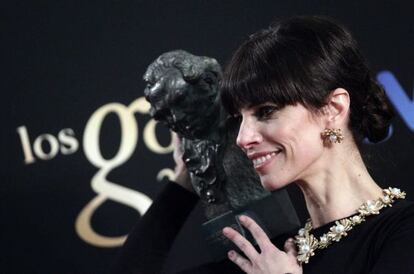Fairytales and harsh reality at Goyas
‘Snow White’ retelling ‘Blancanieves’ wins 10 at a ceremony marked by protests

After seven years gestating in the mind of its director, Blancanieves finally got its fairytale ending at the Goya Awards on Sunday night. Pablo Berger’s black-and-white and silent retelling of Snow White, set in 1920s Andalusia, took home 10 prizes at a ceremony that also found room to recognize box-office smash The Impossible, which won five awards, and was marked by protests against the anti-crisis policies of the Popular Party, as well as some toe-curling moments.
Along with the Best Film award, Blancanieves’ haul included the prizes for Best Actress for Maribel Verdú, Best Original Screenplay, Best Female Newcomer for Macarena García, Best Make-Up and Hair, Best Cinematography, Best Music, Best Original Score, Best Original Song and Best Costume Design.
The Best Director prize, however, went to an emotional J. A. Bayona for The Impossible, who swiftly handed his award to María Belón, the woman on whose story the tsunami drama is based. “This Goya is for 230,000 people [those who died in the 2004 south-east Asian tsunami],” he said.
Among the other winners was Las aventuras de Tadeo Jones, which scooped three awards — Best Animated Feature, Best Adapted Screenplay and, most surprisingly, Best New Director for Enrique Gato — and, as expected, veteran actor José Sacristán. One of the founding members of the Spanish Film Academy, which organizes the event, Sacristán won his first ever Goya, as Best Actor, for his portrayal of a dying hitman in Javier Rebollo’s El muerto y ser feliz.
I’ve seen my father die in a public hospital where there weren’t even any blankets"
After three years away from the movies, Candela Peña was named Best Supporting Actress for her role in Una pistola en cada mano and was the first to make her protest heard. “I’ve seen my father die in a public hospital where there weren’t even any blankets to cover him and where we had to bring him water ourselves,” she said in her speech, referring to her time away. “I have also had a son and I don’t what kind of education he is going to receive.”
With Minister for Education, Culture and Sport José Ignacio Wert watching in the audience, Maribel Verdú dedicated her award to her family and to those who “have lost their home, their future and even their life as the result of a corrupt and obsolete system that allows the robbing of the poor to give to the rich.”
Neither did Academy President Enrique González Macho hold back in his annual address. “This year we have experienced 12 months of concerns,” he said. “The most serious has been the brutal rise in VAT on culture and, therefore, on cinema. It was told to us that it was a transitory measure, essential and exceptional. But results are more negative than predicted. [...] We are not going to give up our effort to get this huge mistake rectified. Those who are not capable of changing their opinion are more in love with themselves than the truth.”
If the protests were in danger of sounding hollow amid the glamour, it came down to Javier Bardem to pull things into focus as he collected the Best Documentary prize for Sons of the Clouds: The Last Colony, his film about the plight of the Sahrawi people. “In the Sahara you cannot make cuts in health, nor in education, like here,” said the actor. “Neither can you throw them out of their home, like here, because they were already evicted 35 years ago. It is important that we don’t let that happen here.”
In the Sahara you cannot make cuts in health, nor in education, like here”
Also calling attention to the political terrain outside of Spain was the winner in the Best Iberoamerican Film category, Cuban zomcom Juan of the Dead, perhaps the most high profile of a growing wave of independently produced movies coming out of the Caribbean island. “By doing this, you have opened a door for Cuban independent cinema that nobody is going to be able to close,” said an emotional Alejandro Bruguésas, the film’s director. Next to him, tears streamed down the cheeks of the movie’s lead actor, Alexis Díaz de Villegas.
The 27th Goyas ceremony will also be remembered for the mistake made by presenters Carlos Santos and Adriana Ugarte when they read out the name of Pablo Cervantes as the winner in the Best Original Song category for Els nens saltvages. As the announced team of winners kissed, hugged and began descending the steps, they were called back as it became clear an envelope mix-up had led to the wrong name being read out. Real winners Juan Gómez Chicuelo and Pablo Berger subsequently collected the prize for Blancanieves.
Tu suscripción se está usando en otro dispositivo
¿Quieres añadir otro usuario a tu suscripción?
Si continúas leyendo en este dispositivo, no se podrá leer en el otro.
FlechaTu suscripción se está usando en otro dispositivo y solo puedes acceder a EL PAÍS desde un dispositivo a la vez.
Si quieres compartir tu cuenta, cambia tu suscripción a la modalidad Premium, así podrás añadir otro usuario. Cada uno accederá con su propia cuenta de email, lo que os permitirá personalizar vuestra experiencia en EL PAÍS.
¿Tienes una suscripción de empresa? Accede aquí para contratar más cuentas.
En el caso de no saber quién está usando tu cuenta, te recomendamos cambiar tu contraseña aquí.
Si decides continuar compartiendo tu cuenta, este mensaje se mostrará en tu dispositivo y en el de la otra persona que está usando tu cuenta de forma indefinida, afectando a tu experiencia de lectura. Puedes consultar aquí los términos y condiciones de la suscripción digital.








































